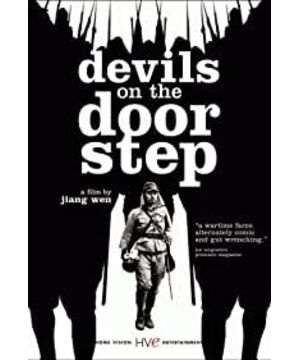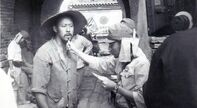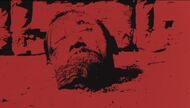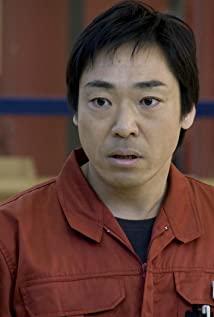It can be said: "The Devil Has Come" should be read and understood by all Chinese, because it involves how we should correctly deal with our historical issues and war issues. Many modern young people have long been prejudiced against Japanese newspapers, but they actually don’t know much about the history of the Japanese invasion of China. There are even some extreme comments on the Internet that we should break out a war and wash Japan’s blood, which actually shows that they have no sense of social responsibility at all. , ignoring history and disrespecting the facts of the past.
In "The Devil is Coming", the ideology of both China and Japan is different from that of ordinary anti-Japanese films. The opening scene of "The Devil is Coming" is very shocking: Ma Dasan and his sister-in-law are having an affair. Judging from the form of the village at that time, the Japanese invaders have been entrenched here for many years, the flashing lights have been hovering above the village, and the Chinese peasants have become slaves to the subjugation of the country. Ma Dasan is still sitting in the act of stealing chickens and dogs! Here, the relationship between China and Japan has formed a ridiculous balance. The Japanese army needs Chinese farmers to serve him (plant crops) and Chinese farmers also exchange for the right to live. The choice of farmers is a helpless move, but in order to survive, they can only accept the current conditions
. The intrusion of "I" has changed this balance, and a person who is more vulnerable than them has emerged, and this person has always been against us. The majestic Japanese! The identity of "I" should be a soldier of the Eighth Route Army - here Jiang Wen is a metaphor for the truth of history. The Eighth Route Army can't compete with the Japanese army head-on, and can only store the captured Japanese soldiers in farmers' homes. The kind-hearted villagers have no political consciousness. They think their lives are threatened by "I", so they do their best to serve the flower house and the interpreter, in fact, just to obtain the right to live in the hands of "I". "I" threats, on the other hand, was threatened by the garrisoned Japanese army, which made the villagers feel extremely difficult.
The film uses a lot of dark humor. Huawu assumed that Ma Dasan brought the farmers in the village to strangle them, but in fact it was just Ma Dasan to deliver food to them. The interpreter taught Hanaya's "swear words". When the feeling of death really came, Hanaya and others felt the pressure of death, and his original "Long Live the Empire of Japan!" became a desire for survival. Jiang Wen restored the "human nature" of the Japanese army here - the flower house and the garrisoned Japanese army were just ordinary farmers, and they had to come to China to become a killing machine in the war environment. Here, the identity of the flower house has been completely restored.
After a series of tossing, "I" did not come to take people. The farmers realized that they had to take active actions to solve these two big problems, but the kind-hearted farmers did not have the courage to kill. Executioners help them execute. At the end of the film, there are many scenes that coincide with this. The executioner said that anyone who killed him would be grateful to him after the head fell. The head turned three times, blinked three times, and the corners of his mouth turned up. He also blinked and smiled after Ma Dasan was finally killed by the flower house. A lot of people misinterpreted the whole movie by not understanding the shot.
In this potential contest, Huawu and the interpreter gradually realized that the villagers did not dare to kill him, and Ma Dasan was always under pressure from the villagers, which eventually led to Huawu and the villagers reaching an unanimous agreement— - In exchange for food, the two have ended this absurd imprisonment in a contracted way.
The most interesting plot of the film appeared: after the flower house and the villagers arrived at the residence of the Japanese garrison, the war logic of the garrison was moved by the simple behavior of the peasants, and after a series of dramatic scenes, the leaders of the Japanese army began to respect These ordinary farmers, under such extreme circumstances, would have a group of farmers dare to come and carry out the simplest survival transaction between farmers, and they were immediately moved by these farmers.
The short-lived military-civilian party represented the short-term return of the identity of the Japanese army. In fact, they were just ordinary farmers. Under the coercion of the war, they reluctantly embarked on the road of murder and arson. They actually had families, but they were ruthlessly covered up under the militarist ideology of the Empire of Japan. At this time, the consciousness of war was silently dissipated between them.
Two things happened that brought the Japanese identity back again. One is the surrender of the Japanese army, which made the Japanese army officers who have always maintained a dominant position in the local area very uncomfortable. The second is the Chinese language taught by the interpreter in Huawu, which is the biggest ridicule for the Japanese army. In addition, in the hearts of Chinese farmers The concept of hierarchy gradually disappeared, (they were in harmony with the Japanese, as if they did not have the same respect for the Japanese army in the past). By putting them in a critical state, they turned back into murderous beasts, and the tragedy of the carnage happened.
Ma Dasan didn't know the reason for the incident. Accidental events allowed him to escape the massacre. Seeing the whole village being mercilessly killed, he had a complete sense of resistance in his heart. The peasants who were originally afraid of killing were forced to go to Liangshan. Ma Dasan started his revenge plan. In fact, he only wanted to kill one person: the flower house where the kindness will avenge the revenge.
The most dramatic end of the film: the national army officer played by Wu Dawei ordered Huawu to kill his benefactor, Ma Dasan. Huawu must not disobey the order, but after the massacre, Huawu still has a good conscience, and he hopes to end Ma Dasan's pain with his own sharp knife. It can be said that he and Ma Dasan formed a tacit understanding at the end. He repeatedly tried the knife and slapped off the insects on Ma Dasan's neck. Here, Huawu can only use this absurd way to redeem his own life. Sin, this is exactly what the director wants to reveal: the absurdity of war. In fact, the war was not only a disaster for the Chinese people, but also a disaster for the Japanese army. They were forced to become killing machines, and they were forced to kill good people who had nothing to do with them.
In the end, Huawu gave Ma Dasan a relief, and the film was also converted from black and white to color at this time. In fact, in Ma Dasan's heart, only a world without war is beautiful. Huawu helped him obtain a This kind of relief is not the greatest irony!
Today, when China is prosperous, how to deal with our psychological problems and historical problems has become the biggest obstacle for a generation. Japan has brought unprecedented harm to China, and if we only promote the heroism of the extreme right and deliberately exaggerate the Japanese army Then we will surely fall into the crisis of war. What human beings need to prevent is the recurrence of tragedy, not the shame that we have suffered from repeating itself.
View more about Devils on the Doorstep reviews










